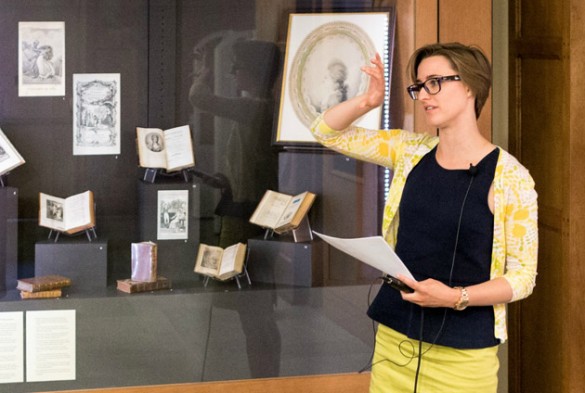
Illuminated manuscripts and rare books are among the items in Special Collections that Vanderbilt students in two College of Arts and Science courses have drawn on to create new exhibits at the university’s Central Library.
The student-curated immersion projects are part of “The Campus Curates: Illumination, Enlightenment and Discovery,” an exhibition opening in phases this summer, according to Celia Walker, director of special projects at Vanderbilt Libraries.
“[rquote]Discovery requires one to step off the path and take a few risks,” Walker said.[/rquote] “These two projects celebrate the immersive work of students who stretched themselves by ‘wandering off the path’ to learn new things while curating exhibits.”
Eight students who were enrolled in Art of the Book, an undergraduate seminar taught by Elizabeth J. Moodey, an assistant professor of history of art, curated Art of the Book: Medieval Necessity and Modern Invention. They investigated medieval and contemporary artists’ books to deduce common threads and broader stories. They also acquired new skills to share oral histories and digital resources.
“We began the course by asking, ‘What would be on our bookshelves if we had to write out all of our books? What do we gain with printing and digitization, and what do we lose?'” Moodey said. “My idea was to consider books from the Middle Ages, when all books were made by hand because there was no alternative, alongside the work of contemporary artists who have chosen what many people think of as an archaic medium. I wanted to understand the enduring appeal of the form and the inventiveness of the artists who are transforming it—to explore what is it about handmade books, especially in the face of widespread digitization, that still makes them worth the trouble.”

In addition, four graduate students in 18th-Century Literature: Rethinking the Enlightenment Novel, examined a period when the novel developed and flourished as a distinct genre. The class, taught by Hanna Roman, Mellon Assistant Professor of French, created an exhibition of 18th-century works from the W.T. Bandy Center’s Morris Wachs Collection.
Roman noted that the rare books enclose multiple layers of history and knowledge. “From the physical composition of the early-modern books, to the social and intellectual questions they embodied and hoped to change, these works reveal the convergences of material, intellectual and cultural history,” Roman said. “They are an important way to bring learning outside of the classroom and to emphasize the diverse reading technologies embodied by the corpus of French literature.”
Books on display include the Nuremberg Chronicle, printed while Christopher Columbus was sailing from Spain, to Welsh artists’ books that examine travel in the 21st century. In addition, items ranging from 18th-century French novels to contemporary gazeteers of Syria are included in the graduate students’ exhibit.
“To truly comprehend the culture and potential of our modern disciplines and the technological interfaces through which we experience them, we must begin by learning about the literary practices of the past,” Roman said. “[lquote]In this ability to bridge past and present lies the importance of the Vanderbilt library’s collections of rare books.”[/lquote]
“The Campus Curates” exhibition is free and open to the community through March 2017. For a schedule of the Central Library’s public hours, click here. For more information about the exhibition or to learn more about curating an exhibition as part of a class, email Celia Walker.